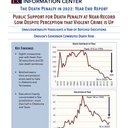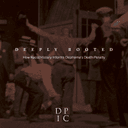
Today, July 1, 2024, the Death Penalty Information Center releases a new report, Lethal Election: How the U.S. Electoral Process Increases the Arbitrariness of the Death Penalty. Using new data and analysis on appellate rulings and grants of clemency, as well as individual stories and case studies from across the country, the report examines how electoral politics distort the fairness and accuracy of capital punishment.
The United States is the only country in the world that elects local prosecutors, and the only one to elect judges in expensive, partisan judicial elections. This unique aspect of the American criminal legal system remains unaffected by the procedures introduced by courts in past years that were intended to minimize arbitrariness in the death penalty system. “The U.S. electoral process inserts many elements of unpredictability and unfairness into death penalty cases. A life-or-death decision should not depend on whether an appeal or clemency petition is heard in an election year, nor should a defendant’s fate rest on who donated money to an official’s campaign fund,” said Robin M. Maher, Executive Director of the Death Penalty Information Center. “But the data suggest that is exactly what is happening.”
Lethal Election includes findings from original research on state supreme court rulings in Georgia, North Carolina, and Ohio. The Death Penalty Information Center found that elected supreme court justices in those states affirm twice as many death sentences during an election year than in any other year. In a new analysis of clemency data, the Death Penalty Information Center has also found that a majority (56%) of clemency grants were made by executives who were not running for reelection. The effect was even stronger, however, when executives had sole authority to make clemency decisions: in those jurisdictions, 84.6% of individual clemencies were granted when the executives did not face reelection. When executives with sole authority to grant clemency did face reelection, they only granted clemency four times in 50 years.
The report also notes how officials use the death penalty as a political issue in election campaigns and advertising. For example, three Tennessee Supreme Court justices boasted in television ads of “upholding nearly 90 percent of death sentences” when running for reelection. When Kelly Ayotte ran for U.S. Senate, her campaign ads featured her decision as New Hampshire Attorney General to seek the death penalty for a man accused of killing a police officer. Ten members of the Commission to Study the Death Penalty in New Hampshire cited Ms. Ayotte’s behavior in their recommendation to abolish the death penalty, writing, “Whether real or imagined, even the appearance of politics influencing a decision of this magnitude in the New Hampshire criminal justice system serves to diminish confidence in the integrity of the system itself.” Ms. Ayotte continues to use the same death penalty case in her 2024 campaign for New Hampshire Governor.
While some politicians continue to promote themselves as tough-on-crime, a shift in public support for the death penalty has changed the practices of prosecutors in some of the counties that historically pursued high numbers of death sentences. In Philadelphia, Pennsylvania, where District Attorney Lynne Abraham earned the nickname “Queen of Death” for her aggressive use of the death penalty in the 1990s, voters have twice elected Larry Krasner, who has pledged never to seek the death penalty. Harris County, Texas, which has produced more executions than any other county in the U.S., has seen a significant drop in the number of death sentences since the 2016 election of District Attorney Kim Ogg, who said in 2017, “I don’t think that being the death penalty capital of America is a selling point for Harris County.”
As public support for the death penalty continues to decline and doubts about fairness and accuracy increase, elected officials are taking notice. Their behavior reflects the fact that, in many places, their constituents no longer prioritize or value zeal for the death penalty. Understanding these changes should lessen the pressure on elected officials to act reflexively and punitively. But so long as we continue to elect decision-makers and empower them with the discretion to make life-or-death decisions, there will be a continuing danger that political aspirations will take priority over considerations of humanity, dignity, and justice. This is one of the great weaknesses of the U.S. death penalty.
Key findings of the report:
- Elected supreme court justices in Georgia, North Carolina, and Ohio are twice as likely to affirm death penalty cases during an election year than in any other year. This effect is statistically significant when controlling for the number of cases each year.
- Changing public opinion means that zealous support for the death penalty is no longer a litmus test for elected officials in many death penalty jurisdictions. Today’s elections feature viable candidates who criticize use of the death penalty and pledge reforms or even non-use, reflecting the significant decline in public support for the death penalty.
- Elected governors were more likely to grant clemency in the past when they did not face voters in an upcoming election. Concerns about voter “backlash” have eased today with declining public support and low numbers of new death sentences and executions, and have led to an increased number of prisoners benefiting from clemency grants, especially mass grants, in recent years.
Robin M. Maher and Leah Roemer, Lethal Election: How the U.S. Electoral Process Increases the Arbitrariness of the Death Penalty, Death Penalty Information Center, July 1, 2024.



